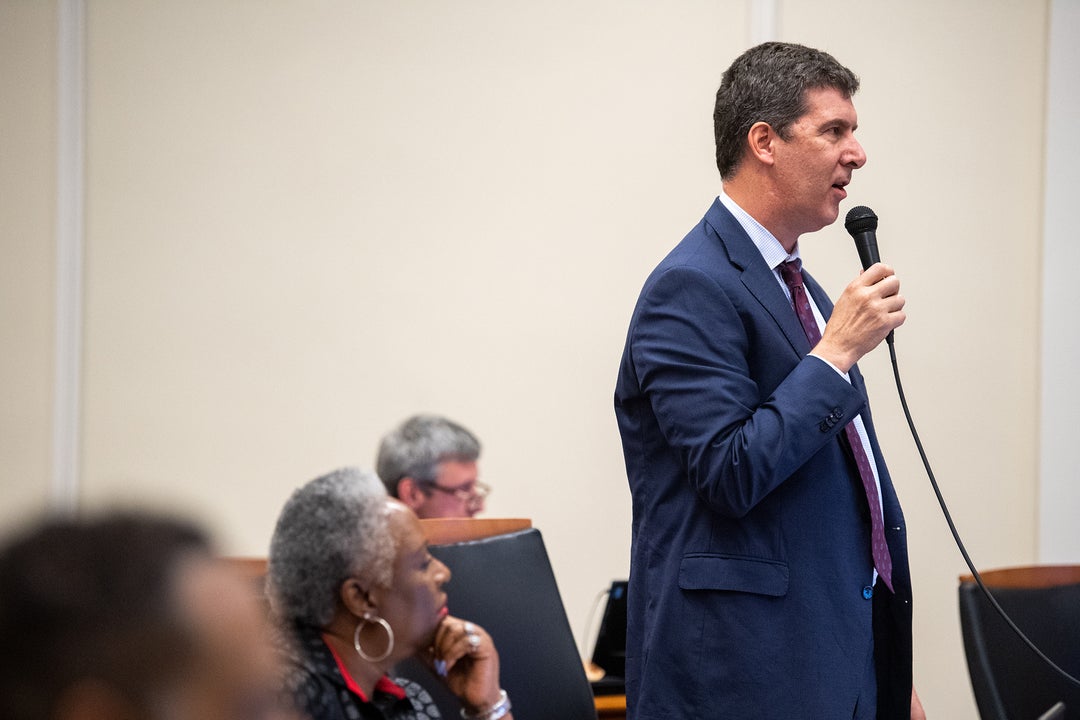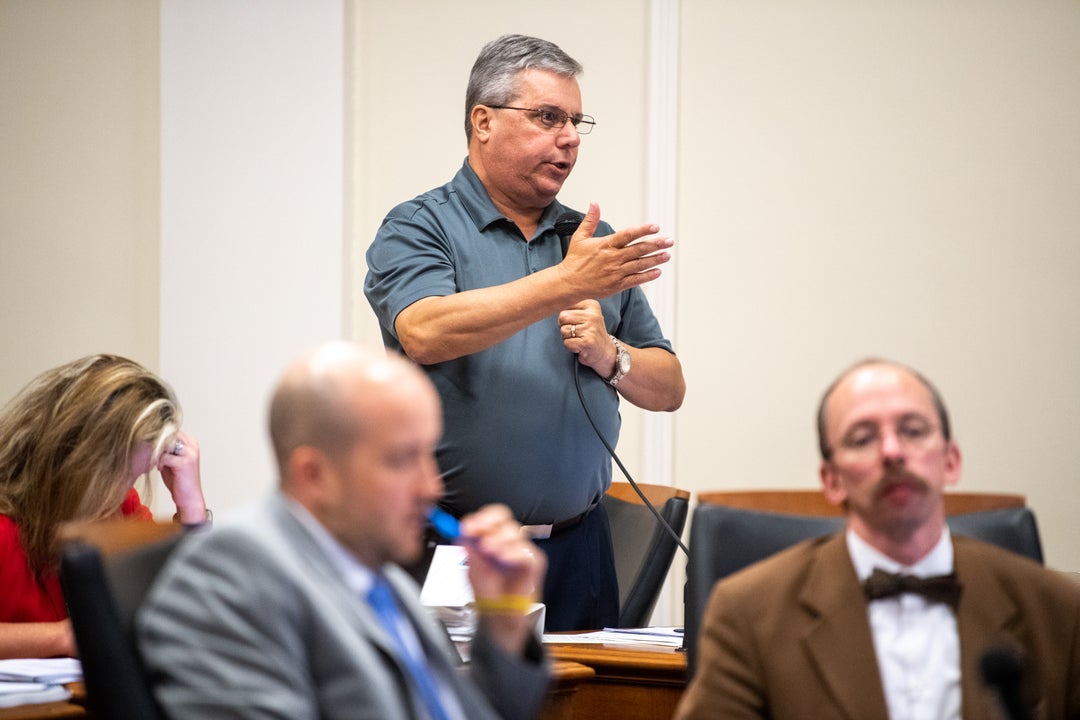Nashville council member drops competing spending plan, backs budget proposal from budget chair – Tennessean

The list of budgets Nashville council members will consider got a bit shorter as a council member threw her support Tuesday behind an option proposed by the council’s budget chair.
Council member Emily Benedict had explored a substitute spending plan to compete against Mayor John Cooper’s budget. Her proposal called for $1.16 property tax increase, the largest of the proposals, to restore raises for school employees and boost funding for community groups.
But on Tuesday, she said she will not submit her budget for consideration, saying she will support a $1.066 tax increase option by At-large council member Bob Mendes.

Mendes last week shared details of his substitute budget proposals: one that aligns closely with Cooper’s budget for a 32% property tax increase of $1 per $100 of assessed value, but with different spending priorities and another that would raise the rate by 34%.
The proposed $1.066 increase to the city’s overall property tax rate would provide funding for step increases and 1% cost-of-living adjustments for city employees and $7.6 million more for Nashville schools as well as $4.9 million to bring minimum wage for the school district to $15 an hour.
Mendes submitted both budgets this week but will not move approval on ether until after a public hearing Tuesday for people to weigh in on the budget.
“Nashville has found itself in a precarious financial position, which requires the Metro Council to bravely pass an equitable moral, and constituent-focused budget,” Benedict said in a statement Tuesday.

Much of Mendes’ increased option, she said, includes the priorities she had in a budget she had explored, including bringing minimum wage for district employees to $15/hour, additional funding for schools and increasing investment in community education and nonprofits.
Key item in Mendes’ budget includes:
- Step increases and 1% cost-of-living adjustments for Metro employees.
- $7.6 million more for Nashville schools as well as $4.9 million to bring minimum wage for the school district to $15 an hour.
- $1 million more for Metro Arts.
- $500,000 more for the GRAD program, which helps those in community colleges.
- $500,000 more for summer youth employment called Opportunity Now.
- Restoration of $25,000 funding each for the Black Chamber of Commerce, the Latin American Chamber of Commerce, the Nashville Area Hispanic Chamber of Commerce and the LGBT Chamber of Commerce.
- $25,000 more for Tennessee State University economic development grant
- $262,000 for the Planning Department to implement plans to enforce “SP” zoning..
- $112,500 more for the Nashville Public Education Foundation.
- $50,000 more for Small Business Incentive.
- $40,000 more for the Nashville Business Incubation Center.
- $85,000 for Juvenile Court clerk for remote IT.
- Under the increased option, it also would require targeted savings of $4 million to the general government and $2.3 million to the school district.
In a statement, Cooper spokesperson Chris Song previously said while the administration has only recently received preliminary details of Mendes’ proposals, they appear to maintain the “fundamental priorities” of Cooper’s budget plan.
“To the extent there may be any appreciable policy differences, these can be worked through during the legislative process with the full Council’s considered input,” he said.
Two more budgets expected
Council members Freddie O’Connell and Steve Glover also have proposed alternative budgets. Both say they will submit their options for consideration.
O’Connell’s budget for a tax increase of only $0.37 per $100 of assessed value includes more funding for nonprofits, community education and Metro Arts Commission. He told The Tennessean on Tuesday his budget includes step-increases for employees and $8 million more for schools.
It also would send $2 million to restore the police body-camera program pilot and $2.8 million to restore 20 positions to hire new officers and equipment.
O’Connell’s proposal banks on about $230 million from tax anticipation notes, other federal relief and the federal Municipal Liquidity Facility program.
The federal program aims to buy up state and local bonds; the administration said the city currently does not meet the terms. O’Connell said he hopes to continue the conversation.
“I am not convinced it is illegal but convinced that multiple people think it’s inappropriate,” he said. “Bottom line for me is that Nashville needs to stand up for opportunities that are unprecedented for these unprecedented times.”
He said if his budget doesn’t get enough votes, he will support Mendes’ proposal.

Glover told The Tennessean on Friday that he is still working to finalize details and had to resubmit his proposal last week. During the budget committee meeting Monday, he said work is still being done.
He did not disclose the exact amount of his proposed tax increase but previously said it would be about a 20% increase.
Council members will have to submit any “budget wish lists” as amendments to budgets by Wednesday, following public discussion during Tuesday’s council meeting.
Support for Cooper and Mendes budgets
Meanwhile, the Nashville Area Chamber of Commerce came out in support Monday for Cooper’s budget proposal.
“The Chamber Board did not arrive at its decision to support Mayor Cooper’s budget and the accompanying property tax rate increase lightly,” Miranda McDonald, chamber vice president of Metro policy, said in a statement. “With the stress of the March tornado and the COVID-19 pandemic on the city’s budget, as well as the uncertainty of how COVID-19 could continue to strain the city in the coming year, the depleted fund balance has become the priority issue for the city.”
The group sent a letter to council members Monday in support of the mayor’s proposal.
But SEIU Local 205, which represents Metro employees, is pushing for Mendes’ $1.066 tax increase plan to be put forward, saying it addresses the chronically low wages in Nashville schools and doesn’t allow Metro employees to fall further behind on pay.
“For two years, SEIU Local 205 members have sounded the alarms about the structural revenue problem with Nashville’s budget caused by the historically low property tax rate. It is unfortunate that it wasn’t addressed before we had a crisis,” SEIU Local 205 President Brad Rayson said in a statement.
Benedict also is calling on the public to urge Mendes to move forward with his increased budget.
“As we finalize the budget, and get a substitute passed, I am committed to getting our financial house in order, which includes both cost cutting and raising revenues. It is only through these actions that we can continue to provide the services it takes to run the city,” she said Tuesday.
Compare the plans
If you own a home appraised at $250,000 in Nashville’s Urban Services District, you pay about $1,968.75 a year in property taxes. Here’s how much more a homeowner could expect to pay a year under the different proposals, which are subject to change.
- Mayor John Cooper — $625 more a year.
- At-large council member Bob Mendes — $666.25 more a year, under his larger increase proposal.
- At-large council member Steve Glover — $393.75 more a year. Glover said he wants to propose about a 20% increase but did not disclose the exact amount.
- Council member Freddie O’Connell — $231.25 more a year.
Yihyun Jeong covers politics in Nashville for USA TODAY NETWORK – TENNESSEE. Reach her at yjeong@tennessean.com and follow her on Twitter @yihyun_jeong.
Published 8:04 PM EDT Jun 2, 2020
